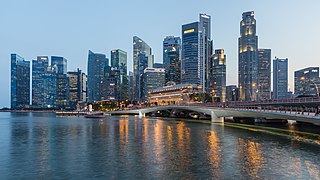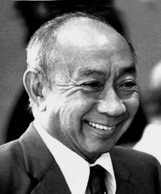Related Research Articles

The economy of Singapore is a highly developed free-market economy with dirigiste characteristics. Singapore's economy has been previously ranked as the most open in the world, the joint 4th-least corrupt, and the most pro-business. Singapore has low tax-rates and the second-highest per-capita GDP in the world in terms of purchasing power parity (PPP). The Asia-Pacific Economic Cooperation (APEC) is headquartered in Singapore.

Sellapan Ramanathan, often known as S. R. Nathan, was a Singaporean politician and civil servant who served as the sixth president of Singapore between 1999 and 2011. He was the longest-serving president in Singapore's history.

The president of the Republic of Singapore is the head of state of Singapore. The president represents the country in official diplomatic functions and possesses certain executive powers over the Government of Singapore, including the control of the national reserves and the ability to revoke and appoint public service appointments. The president also holds the prerogative to grant pardons.

Temasek Holdings (Private) Limited, or simply Temasek, is a global investment company owned by the Government of Singapore. Incorporated on 25 June 1974, Temasek has a net portfolio of US$287 billion as of 2023, with S$27 billion divested and S$31 billion invested during the year.

Goh Keng Swee, born Robert Goh Keng Swee, was a Singaporean statesman and economist who served as Deputy Prime Minister of Singapore between 1973 and 1985. Goh is widely recognised as one of the founding fathers of Singapore. He was also one of the founders of the People's Action Party (PAP), which has governed the country continuously since independence.

Gross National Happiness (GNH), sometimes called Gross Domestic Happiness (GDH), is a philosophy that guides the government of Bhutan. It includes an index which is used to measure the collective happiness and well-being of a population. Gross National Happiness Index is instituted as the goal of the government of Bhutan in the Constitution of Bhutan, enacted on 18 July 2008.

Tony Tan Keng Yam is a Singaporean politician who served as the seventh president of Singapore between 2011 and 2017.

GIC Private Limited is a Singaporean sovereign wealth fund that manages the country's foreign reserves. Established by the Government of Singapore in 1981 as the Government of Singapore Investment Corporation, of which "GIC" is derived from as an acronym, its mission is to preserve and enhance the international purchasing power of the reserves, with the aim to achieve good long-term returns above global inflation over the investment time horizon of 20 years.

Tharman Shanmugaratnam is a Singaporean statesman and economist who served as Senior Minister of Singapore between 2019 and 2023, Coordinating Minister for Social Policies between 2015 and 2023, Chairman of the Monetary Authority of Singapore between 2011 and 2023, and Deputy Chairman of GIC between 2019 and 2023. He also served as Deputy Prime Minister between 2011 and 2019, Minister for Finance between 2007 and 2015, Minister for Education between 2003 and 2008. A former member of the governing People's Action Party (PAP), he was the Member of Parliament (MP) representing the Taman Jurong division of Jurong GRC between 2001 and 2023.
The economics of happiness or happiness economics is the theoretical, qualitative and quantitative study of happiness and quality of life, including positive and negative affects, well-being, life satisfaction and related concepts – typically tying economics more closely than usual with other social sciences, like sociology and psychology, as well as physical health. It typically treats subjective happiness-related measures, as well as more objective quality of life indices, rather than wealth, income or profit, as something to be maximized.
The Global Interdependence Center (GIC) is a Philadelphia-based non-profit organization that holds conferences and programming to increase global dialogue and promote free trade, in order to improve cooperation and understanding among nation states, with the goal of reducing international conflicts and improving worldwide living standards.

The powers of the president of Singapore are divided into those which the president may exercise at their own discretion, and those they must exercise in accordance with the advice of the Cabinet of Singapore or of a minister acting under the general authority of the Cabinet. In addition, the president is required to consult the Council of Presidential Advisers (CPA) when performing some of their functions. In other cases, the president may consult the CPA if they wish to but is not bound to do so.
Environmental, social, and corporate governance (ESG), also known as environmental, social, and governance, is a set of aspects considered when investing in companies, that recommends taking environmental issues, social issues and corporate governance issues into account.

Tan Kin Lian is a Singaporean businessman who served as the chief executive officer of NTUC Income between 1997 and 2007, before standing for the 2011 presidential election.

Income Insurance Limited, commonly known as Income, is one of the leading composite insurers in Singapore, offering life, health and general insurance. Established in Singapore in 1970 to plug a social need for insurance, Income continues to serve the protection, savings and investment needs of individuals, families and businesses today to empower better financial well-being for all.

Presidential elections were held in Singapore on 27 August 2011. Four eligible candidates were issued certificates of eligibility by the Presidential Elections Committee, and were nominated on Nomination Day.

Adrian Tan Cheng Bock is a Singaporean politician and medical practitioner. A former member of the governing People's Action Party (PAP), he was the Member of Parliament (MP) for Ayer Rajah SMC between 1980 and 2006. As a member of Progress Singapore Party (PSP), he served as Secretary-General of PSP between 2019 and 2021 and served as PSP Chairman since 2021.

Presidential elections were scheduled to be held in Singapore in 2017. The elections were reserved for candidates from the Malay community, who had not held the presidency since 1970.

The reserves of the Government of Singapore is a collection of assets, after subtracting for liabilities, owned by the Government of Singapore and the entities listed in the fifth schedule of the Constitution, such as the Central Provident Fund (CPF), Housing and Development Board (HDB) and Temasek Holdings amongst others. This also includes the Official Foreign Reserves (OFR) accumulated by the Monetary Authority of Singapore (MAS) and the assets managed by GIC Private Limited (GIC). Liabilities held by the Government include MAS-issued bonds such as Singapore Government Securities (SGS) and Government-issued Special Singapore Government Securities (SSGS) that are exclusively purchased by CPF with monies from CPF account holders.
Ng Kok Song is a Singaporean investment manager. He was previously the group chief investment officer at Singapore's sovereign wealth fund, GIC, where he had a 42-year career in the investment of Singapore's foreign reserves. He has also held positions at the Monetary Authority of Singapore (MAS) and the Ministry of Finance (MOF).
References
- ↑ Channel NewsAsia, “Singaporeans must contribute to nation's 'social reserves': President Tony Tan” 5 November 2013.
- ↑ Gross National Happiness, The Centre for Bhutan Studies.
- ↑ "XIN MSN News, 5 November 2013". Archived from the original on 5 November 2013. Retrieved 5 November 2013.
- ↑ Istana, Biography of the President. Archived 2013-09-07 at the Wayback Machine
- ↑ Leong Wai Kit, “S’pore needs both financial and ‘social’ reserves to thrive: President Tony Tan”, Today, 6 November 2013.